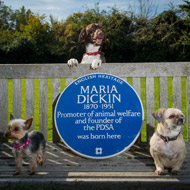PDSA's founder honoured with Blue Plaque

Maria Dickin opened her first clinic in Whitechapel in 1917 after witnessing the suffering of animals in the poverty stricken East End.
PDSA's founder Maria Dickin has been honoured with an English Heritage Blue Plaque on the house in Hackney where she was born.
The Plaque has been placed at number 41 Cassland Road, Hackney (Formally 1 Farringdon Terrace), where Maria was born in 1870. The three storey end-of-terrace house was her home for the first two or three years of her life and is just a few miles from Whitechapel, where she began PDSA’s work.
Maria Dickin opened her first clinic in Whitechapel in 1917 after witnessing the suffering of animals in the poverty stricken East End. The sign on its door read: “Bring your sick animals. Do not let them suffer. All animals treated. All treatment free.”
The centre was an immediate success: within four years a further seven clinics were opened across London and by Dickin’s death in 1951, PDSA provided a regular service in 207 communities across Britain, as well as animal ambulances, animal hospitals and five homes for stray dogs.
The PDSA is now the UK’s leading veterinary charity; each year it provides 2.7 million treatments to over 470,000 pets. Dickin’s original objective – to offer treatment to sick animals whose owners were unable to pay for it – remains at PDSA’s heart.
Howard Spencer, English Heritage’s Blue Plaque historian, said: “Maria Dickin was a pioneering woman whose achievements in alleviating the suffering of animals were immense. This blue plaque now marks the place where her own story began, which like PDSA grew out of humble beginnings to play a significant role in animal welfare.”
PDSA’s director general, Jan McLoughlin, said: “We owe our existence to Maria Dickin. Her passion for improving the lives of animals in war-torn London almost a hundred years ago became the catalyst for great change.
It is fantastic that Maria’s birthplace is being recognised by the English Heritage as the starting point for one woman’s incredible journey to change the face of pet welfare in the UK. Maria’s legacy lives on each and every day through PDSA’s network of 51 Pet Hospitals where our life-saving veterinary work continues alongside our extensive education and prevention programmes.”



 The Veterinary Medicines Directorate (VMD) is inviting applications from veterinary students to attend a one-week extramural studies (EMS) placement in July 2026.
The Veterinary Medicines Directorate (VMD) is inviting applications from veterinary students to attend a one-week extramural studies (EMS) placement in July 2026.